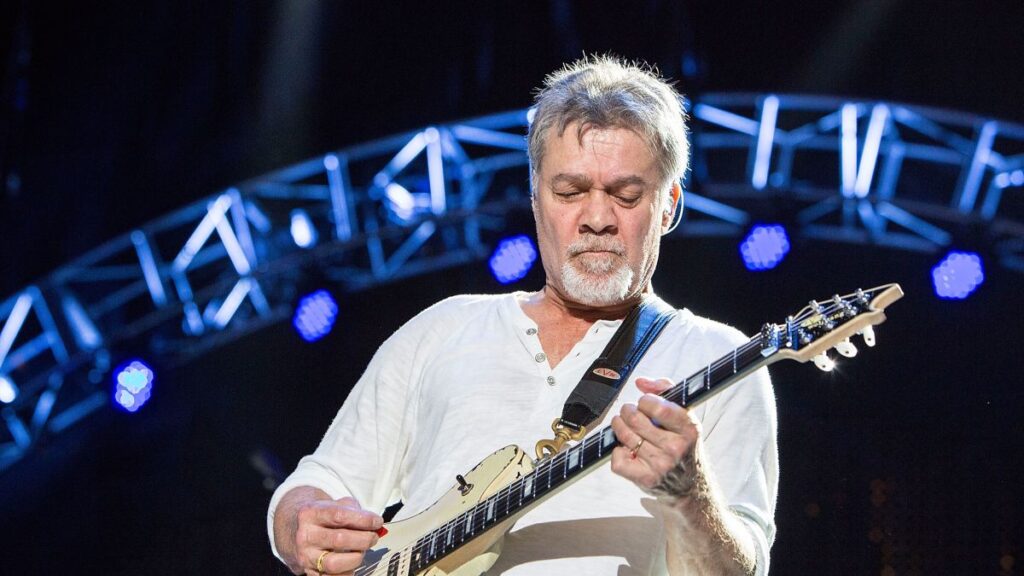So the reaper that is the year 2020 keeps reaping. Today, it was legendary guitarist and founder of multi-platinum band Van Halen, Eddie Van Halen. Present reports indicate he passed away today at St. Johns Hospital in Santa Monica, California. He had fought a long battle with throat cancer. He was 65 years old.

What can you say that hasn’t already been – or will be, in tribute – said about Eddie Van Halen? He was the seminal sound of the 1980s, even though the band originated in the 1970s. There were fiery guitarists that came before him. This can’t be denied, but Van Halen seemed to change the very nature of rock music itself. You couldn’t have a rock band at that time that did not have a flashy, virtuoso shredder. It was a requisite.
Setting aside that first chapter, the David Lee Roth years of VH1 through 1984, Van Halen had many other notches on that proverbial bedpost to cement his legacy.
Somewhat related, Michael Jackson’s “Billie Jean” broke down the color barrier on MTV in 1983 but it was, in my opinion, the arrival of “Beat It” which cemented this radical shift, and that was largely due to Van Halen’s searing solo in the bridge. The full rock treatment of the song made it okay for suburban kids who had silly notions of what was cool and what was not cool to put Jackson in the former category. This elevated the Thriller album to sales and acceptance unseen before that time. We cannot attribute that solely to Van Halen’s participation, but it clearly helped.
Another major win for Eddie was when Roth left the band. This is almost always the death blow for a group when someone as lunatic and charismatic as Roth departs and you have to find someone to step into that spotlight. Enter Sammy Hagar, a singer who previously worked with VH producer Ted Templeman for the group Montrose. The story goes that Hagar was first suggested for the vocalist spot before David Lee Roth back in the ’70s, but plans changed. Now he was again in the mix, and contrary to the example of dozens of bands who couldn’t survive that pivotal shift, Van Halen the band thrived, racking sales and hits like “Why Can’t This Be Love,” “Dreams,” “Finish What Ya Started,” and “Right Now.”
Unfortunately, the hard-partying reputation for the group also survived, along with the ever-present cigarette Eddie toted as he worked his miracles on his Frankenstrat guitar, the iconic red guitar with the haphazard black and white striping.
Internal crises also became part of the regular narrative. After Roth left and Hagar stepped in, stories of infighting, clashing egos and more filled the rock gossip columns. Hagar would be out, back in, out again, with Roth stepping in, dropping vocals for two new tracks on the Greatest Hits collection, then out again. Hagar’s back in. Then out and replaced with the head-scratching choice of Extreme’s Gary Cherone as replacement. Bassist Michael Anthony is kicked out owing to his longstanding friendship with Hagar, one supposes. Eddie claims Anthony contributed very little to the final product of those Van Halen hits. Acrimony boils over. Mix well. Repeat.
Alcohol also takes its toll. Between the Cherone-led Van Halen III and the Roth reunion, Eddie had major surgery to deal with throat cancer, losing a part of his tongue in the process. These are lost years best described in the tabloids than here, but it is safe to say that this specific era would likely have taken him had fate, and second wife Janie & son Wolfgang, not been in the mix. Everything afterward is a blessing of sorts.
The final leg of Van Halen the band found a regrouping with Roth and the addition of Wolfgang on bass. A Different Kind of Truth arrives in 2012 with fanfare, begrudging acceptance from critics stating it was better than it could have, or should have been. It does okay, but things would never be as they once were. Roth’s voice, especially on the tour, was problematic. The songs themselves were mostly a hodge podge of previously written tunes that didn’t make it onto earlier records, now recorded with producer John Shanks at the helm. And frankly, they were a legacy band now. They would do well with the fan base and curious, but the pop charts didn’t sound like that anymore and the returns couldn’t help but diminish with such a vast paradigm shift at work.
It was not like the ’80s. The era of the “hair metal” bands took the wrong message from the Van Halen model, in large part. They had tons of flash and style, but lacked that extra something. They had the nastiness, but much of it seemed like an unearned grit. The sprayed and teased hair, the neon lights and stage flashbombs, the overall impression that the jeans were bought with the rips already carefully added at manufacture. They weren’t earned.
People still remember the Warrants and Poisons and RATTs with affection, but with a major heap of nostalgia for the time. Along with them were the action movies of the day with big, bombastic rock soundtracks and that lite-Van Halen sheen painted over it all. What made VH transcend the times to be a genuine part of rock music history?
With respect to all the artists previously mentioned, each who brought talent to the stage and speaker, Van Halen was just…better. Sure, they liked singing about getting drunk, high, and laid, but there was a virtuosity brought by each member, and that includes Roth’s showmanship and Hagar’s chops. If you’re lumping in all the hard rock groups on style choices alone, Van Halen was always going to rise to the top.
You’re thinking about the sizzling fret nightmares just before their cover of Roy Orbison’s “(Oh) Pretty Woman,” or “Eruption,” or even Eddie’s sudden, shocking left turn to the keyboard for the signature riff of “Jump.” I’d point you to the intro of “Little Guitars” off the Diver Down LP. Here, you get the full force of Eddie Van Halen’s talent in a tour de force of Spanish guitar flurries, gentle passages, tuneful construction. The main song ain’t that bad either, with the key guitar lines being clawed, giving the tune a hyper-rhythmic tone. It is, in my opinion, the most underrated track in the Van Halen canon, and the one that genuinely reveals the talent that has been lost.
We keep getting older. We keep losing our heroes. It is impossible to know but easy to speculate that had Eddie Van Halen not burned his candle as hot as he did, he would not have incurred the damage he faced, which contributed to his demise. Given the totality of the story, it is also amazing we had him here as long as we did. Forget 5150. 2020 can’t end soon enough.
